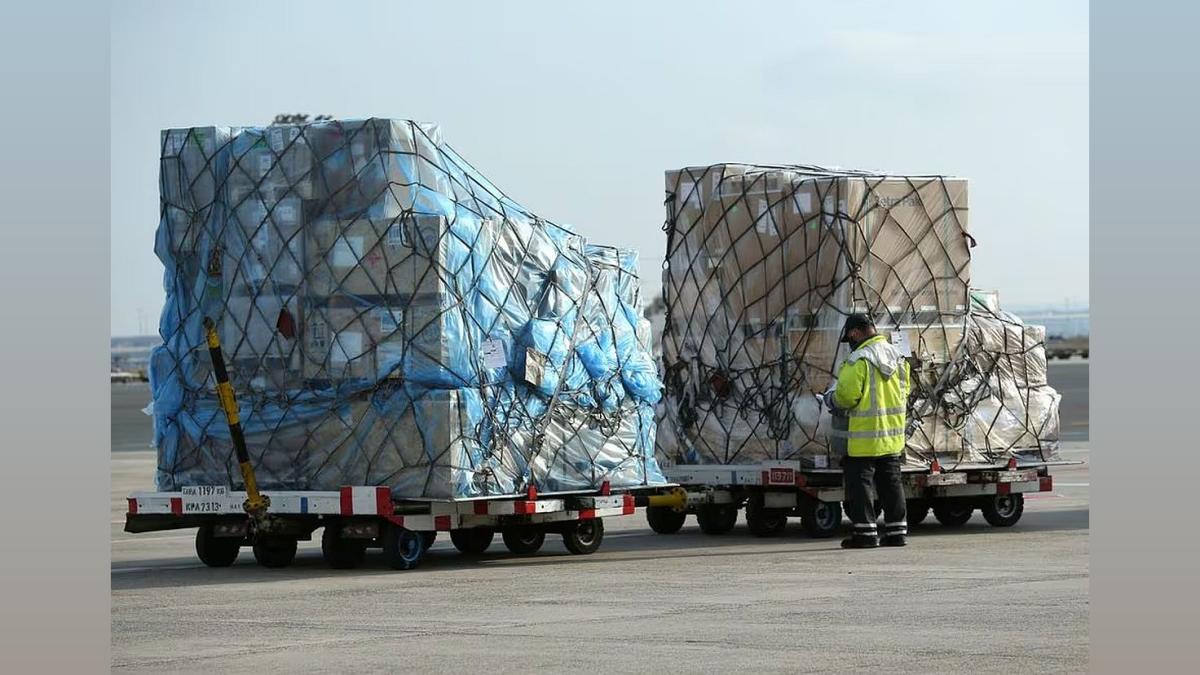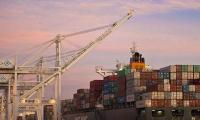Red Sea Crisis: India Monitors Exporters' Credit Flow
India's Commerce Ministry has asked the Department of Financial Services to monitor credit flow to exporters facing freight cost troubles due to the Red Sea crisis. The situation has escalated due to attacks by Yemen-based Houthi militants, forcing ships to take longer routes, increasing shipping...

Photograph: Ralph Orlowski/Reuters
New Delhi, Jan 17 (PTI) The Commerce Ministry on Wednesday asked the Department of Financial Services (DFS) to monitor and maintain credit flow to exporters, who are facing freight cost troubles due to the Red Sea crisis, a senior official said.
Issues of exporters were discussed during an inter-ministerial meeting here, which was chaired by Commerce Secretary Sunil Barthwal.
Officials from DFS, Shipping, external affairs and defence ministries were present at the meeting.
"We have told DFS to monitor the bank credit and ease the bank credit for exporters. Monitor that credit flow is maintained. DFS will be monitoring the requirements of exporters, the official said.
The official added that the defence ministry has improved its surveillance in the Arabian Sea and has put in place more mechanisms for that.
The situation around the Bab-el-Mandeb Strait, a crucial shipping route for traders connecting the Red Sea and the Mediterranean Sea to the Indian Ocean, has escalated due to attacks by Yemen-based Houthi militants.
Because of this, the shipping cost have jumped and the consignments are taking more time to reach Europe and the US as the shops are taking the Cape of Good Hope route, encircling Africa.
"Currently we are monitoring that the volume should not get affected. So far volumes from major ports are stable," the government official who does not wish to be named said.
The inter-ministerial group will meet again.
"We are collecting all the inputs," the official said adding the shipping ministry was asked to monitor the volumes.
The meeting was called by the commerce ministry to discuss the way forward on the trade front in the wake of ongoing problems in the Red Sea.
Due to these attacks, the shippers are taking consignments through the Cape of Good Hope, resulting in delays of about 14-20 days and also higher freight and insurance costs.
Exporters are apprehensive that the crisis may cause some trade disruption because the cost of moving it around becomes expensive.
The commerce ministry has also asked the ECGC not to increase the export credit interest rates. State-owned ECGC is an export promotion organisation, seeking to improve the competitiveness of Indian exports by providing them with credit insurance covers.
Exports to Europe, the east coast of the US and Latin America are facing problems due to the crisis.
Due to the attacks, shipping lines have reduced their movement through the Red Sea and are taking the longer route via the Cape of Good Hope, encircling the African continent.
The trade route of Bab-el-Mandeb Strait, the Suez Canal, and the Red Sea is shorter and faster than the Cape of Good Hope route, making it the preferred option for most shipping companies.
The route starts from major Indian ports like Mumbai, JNPT, or Chennai, heads westward through the Arabian Sea, enters the Red Sea, and navigates through the Suez Canal into the Mediterranean Sea. From there, ships can reach various European ports, depending on their destination.
The Cape of Good Hope route is longer and slower, but it avoids the potential for delays or disruptions at the Suez Canal. It is typically used for bulk cargo shipments where time is less critical or when political instability in the Middle East raises concerns about using the Suez Canal.
The route starts from the same Indian ports, heads southward across the Indian Ocean, rounds the Cape of Good Hope at the southern tip of Africa, and then sails northward along the west coast of Africa before entering the Mediterranean Sea and reaching European ports.
Issues of exporters were discussed during an inter-ministerial meeting here, which was chaired by Commerce Secretary Sunil Barthwal.
Officials from DFS, Shipping, external affairs and defence ministries were present at the meeting.
"We have told DFS to monitor the bank credit and ease the bank credit for exporters. Monitor that credit flow is maintained. DFS will be monitoring the requirements of exporters, the official said.
The official added that the defence ministry has improved its surveillance in the Arabian Sea and has put in place more mechanisms for that.
The situation around the Bab-el-Mandeb Strait, a crucial shipping route for traders connecting the Red Sea and the Mediterranean Sea to the Indian Ocean, has escalated due to attacks by Yemen-based Houthi militants.
Because of this, the shipping cost have jumped and the consignments are taking more time to reach Europe and the US as the shops are taking the Cape of Good Hope route, encircling Africa.
"Currently we are monitoring that the volume should not get affected. So far volumes from major ports are stable," the government official who does not wish to be named said.
The inter-ministerial group will meet again.
"We are collecting all the inputs," the official said adding the shipping ministry was asked to monitor the volumes.
The meeting was called by the commerce ministry to discuss the way forward on the trade front in the wake of ongoing problems in the Red Sea.
Due to these attacks, the shippers are taking consignments through the Cape of Good Hope, resulting in delays of about 14-20 days and also higher freight and insurance costs.
Exporters are apprehensive that the crisis may cause some trade disruption because the cost of moving it around becomes expensive.
The commerce ministry has also asked the ECGC not to increase the export credit interest rates. State-owned ECGC is an export promotion organisation, seeking to improve the competitiveness of Indian exports by providing them with credit insurance covers.
Exports to Europe, the east coast of the US and Latin America are facing problems due to the crisis.
Due to the attacks, shipping lines have reduced their movement through the Red Sea and are taking the longer route via the Cape of Good Hope, encircling the African continent.
The trade route of Bab-el-Mandeb Strait, the Suez Canal, and the Red Sea is shorter and faster than the Cape of Good Hope route, making it the preferred option for most shipping companies.
The route starts from major Indian ports like Mumbai, JNPT, or Chennai, heads westward through the Arabian Sea, enters the Red Sea, and navigates through the Suez Canal into the Mediterranean Sea. From there, ships can reach various European ports, depending on their destination.
The Cape of Good Hope route is longer and slower, but it avoids the potential for delays or disruptions at the Suez Canal. It is typically used for bulk cargo shipments where time is less critical or when political instability in the Middle East raises concerns about using the Suez Canal.
The route starts from the same Indian ports, heads southward across the Indian Ocean, rounds the Cape of Good Hope at the southern tip of Africa, and then sails northward along the west coast of Africa before entering the Mediterranean Sea and reaching European ports.
You May Like To Read
TODAY'S MOST TRADED COMPANIES
- Company Name
- Price
- Volume
- Welcure-Drugs-and
- 0.46 ( -4.17)
- 14039847
- Vodafone-Idea
- 11.27 ( -0.79)
- 13617616
- Sylph-Technologies
- 1.00 (+ 3.09)
- 8858849
- Meesho-L
- 191.75 (+ 12.30)
- 5611974
- Sunshine-Capital
- 0.27 (+ 3.85)
- 4278950






